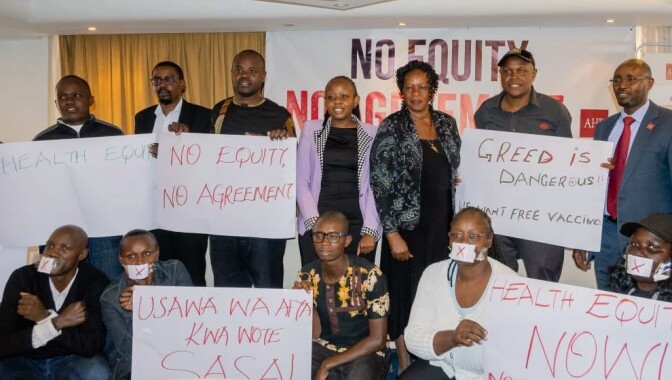By Peter Ochieng
The AIDS Healthcare Foundation (AHF) alongside civil society organizations are against what they term as deeply flawed proposal for the World Health Organisation’s (WHO) pandemic agreement.
They say they are opposed to profit-driven policies, at the expense of global health.
According to the civil society, the April 16, 2024 proposal for the WHO pandemic agreement has undergone extensive negotiations, resulting in a text that has been watered down and lacks accountability.
“The recent iteration of the text is filled with platitudes, anaemic in obligations, and devoid of any accountability,” stated Dr. Samuel Kinyanjui, Country Director of AHF Kenya.
United Nations (UN) member countries are expected to settle on a pandemic agreement, during the World Health Assembly from May 27th to June 1st, 2024.
Under the present proposal, only 20% of pandemic-related health products are guaranteed to the WHO, leaving the remaining 80% vulnerable to market forces.
“Such an arrangement will effectively leave 80% of crucial vaccines, treatments, and diagnostics prey to the international scramble seen in the COVID-19 era,” noted Dr. Kinyanjui.
Equally troubling, they said, is the absence of effective mechanisms for accountability and enforcement.
“Equity will not be operationalized without effective mechanisms for accountability and enforcement,” added Timothy Wafula, Program Manager, Kenya Legal and Ethical Issues Network on HIV and AIDS (KELIN).
“Relying solely on state self-reporting mechanisms does not work. The absence of independent oversight and clear enforcement frameworks undermines the agreement’s effectiveness,” added Kinyanjui.
On his part, James Kamau, CEO of the Kenya Treatment Access Movement (KETAM), emphasized the need for binding financial commitments, to establish a robust pandemic prevention, preparedness, and response architecture.
“Without binding financial commitments and a coherent long-term financing strategy, we risk repeating the failures of the past,” he warned.
Dr. Kinyajui insisted that “empty handshakes in Geneva will not prevent another global health disaster.”



